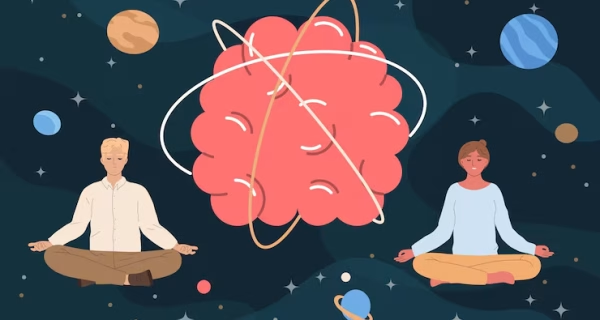Why practice mindfulness? Proven benefits for body and mind
Mindfulness isn't just a fad. It's a powerful, scientifically validated tool that can transform the way we live. In this article, I'll tell you about the main benefits of practicing mindfulness regularly.
- Stress reduction
One of the best-known benefits is mindfulness's ability to reduce stress. By training the mind to be present, we stop reacting automatically to situations and begin to respond with more calm and clarity.
Do you know what cortisol is? Cortisol is a hormone we release when we're under certain levels of stress and anxiety. Stress appears as a response to these situations; therefore, when anxiety decreases, cortisol levels also drop significantly. Several studies have demonstrated this. The same thing happens with blood pressure; that is, blood pressure remains elevated in people who regularly experience stress and anxiety. Therefore, when this stress and anxiety decrease, blood pressure also drops.
- Better emotional control and management
The key feature, and the reason many people are starting to incorporate mindfulness practice into their daily lives, is that it provides individuals with better and more effective emotional management. That is, it helps to identify emotions, accept them, acknowledge them, and learn to manage them appropriately.
Thus, over time, the person begins to take control of their emotions, preventing the unfortunately common scenario of emotions overwhelming them. This was demonstrated in studies, among others, by Ortner, a researcher at the University of Toronto, who concluded that people who practice mindfulness in their daily lives have greater self-control compared to those who do not.
- Improved mental health
Numerous studies show that mindfulness helps reduce anxiety, depression, and ruminative thoughts. It is an effective tool in therapies such as MBCT (Mindfulness-Based Cognitive Therapy) for preventing relapses in depression.
- It improves attention span.
Being able to focus our attention on what is happening "here and now" and bring it to the present moment is another goal that people set for themselves and eventually learn through continued and regular practice of Mindfulness.
After some time, once a person becomes familiar with Mindfulness and gradually incorporates awareness training, mindfulness, and meditation, they are able to do so with some ease and voluntarily direct these mental processes. Their ability to concentrate increases, and they are less likely to fall into lapses and distractions that are not helpful in our daily lives. If you want to know more details about this, you can look for bibliography on Walsh and Shapiro, experts in the field.
This fact has led experts to recommend this practice as a complementary therapy in attention deficit disorders.
- Improved memory capacity
If your ability to concentrate increases, as I just explained, so does your memory. Therefore, if you can block out distractions and truly focus, your memory will also function better.
Most of the studies Those who have studied this variable conclude that with the practice of mindfulness, a significant increase in the volume of gray matter in our brain is observed. They also conclude that an increase in the size of the hippocampus and cerebral cortex is seen, brain areas that are related to memory and learning; this is another benefit of mindfulness.
- Improvement of physical health
Regular practice can lower blood pressure, strengthen the immune system, and reduce symptoms of chronic illnesses such as pain or fatigue. insomnia.
People who practice mindfulness sleep more and better. But, How does it help us? You might ask yourself.
Because it leads to a state of calm and increased relaxation, as we have said before, and this means that the person feels calmer and without certain worries in their head that steal their time.
One of the main reasons people who suffer from insomnia report in consultations with their family doctor and other professionals is that once they lie down in bed, their mind starts racing, constantly turning things over in their minds, causing them to stay awake and... insomnia It is established and the ground does not reach.
In this regard, I would like to quote Holly Roy, author of a study she conducted on this topic, who points out: “People who practice mindfulness daily show better control over their emotions and behaviors during the day. Furthermore, these individuals exhibit low levels of cortical activation at night, which helps them sleep better.”
- Better personal relationships
By being more present and mindful, we improve our communication, develop greater empathy, and manage conflicts more effectively. By incorporating compassion and kindness toward ourselves and others, we become less affected by our surroundings and strengthen our connections with ourselves and others. It could be said that we begin to see relationships with a different perspective, with the eyes of a child, free from judgment and preconceived notions.
Mindfulness has many benefits for our mental, emotional, and physical health, but it's important to understand that it's not a magic bullet. It's a simple and accessible practice that can generate significant changes—changes we call transformation. The key is to gradually integrate it into your daily life and experience its benefits for yourself.
And that's why we are at your disposal to help you integrate it into your daily life with the MBW (Mindfulness Based Wellbeing) program where you can experience and live all its benefits for yourself.











